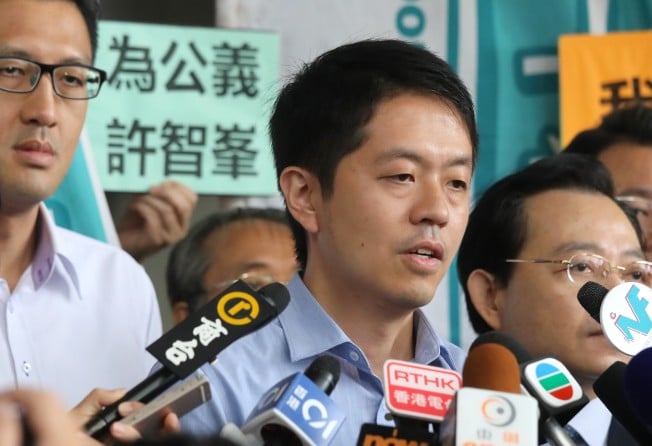
Democratic Party lawmaker Ted Hui ordered to do 240 hours of community service and fined over phone-snatch incident in Hong Kong legislature
- Politician took phone from civil servant he believed was spying on him in Legislative Council
- Incident happened during sensitive co-location debate which led to Chinese laws being applied in Hong Kong for first time

A Hong Kong opposition lawmaker found guilty of assault for snatching a phone from a public officer has been ordered to do 240 hours of community service.
Ted Hui Chi-fung, 36, who argued he was only trying to expose the government’s “paparazzi-like” tactics in scrutinising lawmakers, was also fined HK$3,800 by Eastern Court on Tuesday.
He was convicted last month of one count of common assault on senior executive officer Christina Leung Ngok-sze in 2018.
Magistrate Cheng Lim-chi also found the Democratic Party lawmaker guilty of obstructing a public officer, as his behaviour had interrupted Leung’s work.

Passing sentence, Cheng said he believed accessing the government’s information to be the most serious of all three charges, but he noted that Hui’s actions did not lead to any actual loss to the
government, leaving community service as an option.
The maximum sentence for the assault charge is one year in jail, and six months behind bars and a HK$1,000 fine for obstructing a public officer. Obtaining access to a computer with a view to dishonest gain carries a maximum sentence of five years in jail.
“I accept that there was a certain degree of remorse [from the defendant],” said the magistrate, who pointed to a positive report written by the probation officer, and a mitigation letter from the pastor of Hui’s church.
However, he said the defendant’s position as a legislative councillor played only a small part in his deliberations, a partial rejection of his lawyer’s plea that the penalty could affect Hui’s seat and his chance to run for election in the future.
“Otherwise, lawmakers and anyone taking part in elections would think they have a special privilege,” Cheng said.
He added that the father of two’s position as the sole breadwinner of his family should not be a prime consideration either, rejecting what Hui told the probation officer.
I am very thankful that I could walk out [of the court] today
Speaking outside court, Hui said he would fight for his cause in a better way in the future, and directed his supporters’ attention to the government’s controversial extradition bill.
The proposal, which would make it possible for suspects in the city to be sent to mainland China for trial for the first time, has been widely criticised abroad and sparked a massive public protest on Sunday.
“I am very thankful that I could walk out [of the court] today. I will be fending off [this bill] in Legco with all I have,” Hui said.
The court heard that following the incident on April 24 last year, Hui had accessed the contents of the phone and sent five files to his own email account. For that, he was found guilty of one further count of obtaining access to a computer with dishonest intent.
The incident took place in the Legislative Council complex during a debate on the controversial co-location plan, which eventually led to mainland Chinese laws being applied in Hong Kong for the first time.
When the government sent staff to monitor lawmakers in the legislature, Hui argued the move infringed their privacy and compared the officers to paparazzi.
He also cited during the trial fears that the information could be passed to mainland Chinese officials in Hong Kong.
On the day, Hui approached Leung in the lift lobby of the building, before snatching her phone. He ran to a men’s toilet, where he sent five files from the government phone to his own email account.
But the magistrate ruled there was no evidence Leung and the government had infringed lawmakers’ privacy. Hui’s complaint to the Privacy Commission had yielded no response, he said.
On the contrary, Cheng found that the lawmaker had caused Leung to suffer fear and anxiety as a result of the assault. He said Hui had not considered the consequences and only cared about snatching a phone he thought would expose evidence of a privacy infringement.
A spokesman from the Department of Justice said it would study the reasons for the sentence to determine whether any follow-up action was called for.